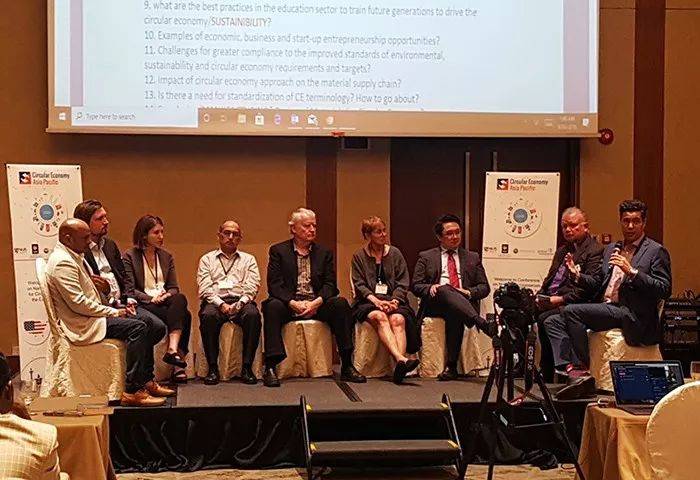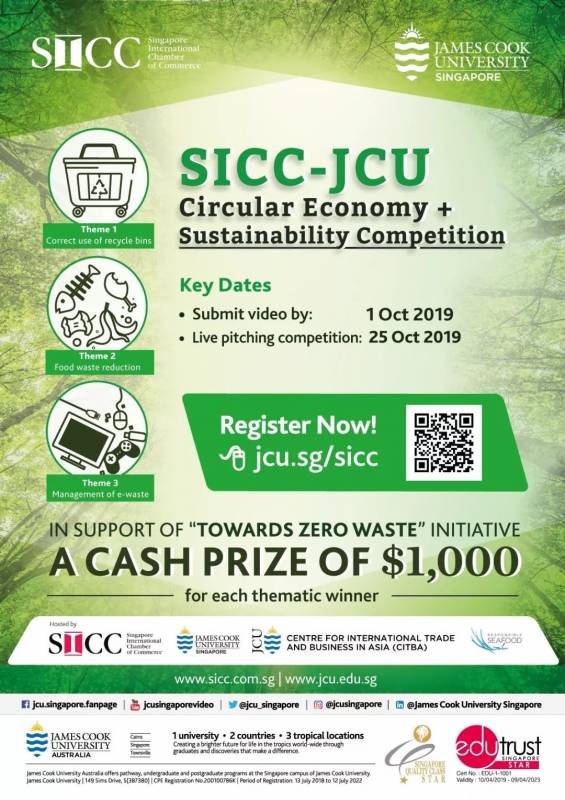循環經濟
隨著世界範圍內資源枯竭和浪費的增加,擁抱循環經濟比以往任何時候都更爲重要。循環經濟可以使産品生産效率變得更高,資源和材料也可以得到長時間地重複利用。
在東亞太平洋納米微材料循環經濟和可持續發展會議上,詹姆斯庫克大學新加坡校區Associate Professor Adrian Kuah受邀擔任“循環經濟的機遇和差距”專題討論的發言人。該會議由新加坡國立大學和中佛羅裏達大學聯合舉辦,共爲期四天。該專題討論于8月30日舉行,即會議的第二天。
Associate Professor Adrian Kuah目前是循環經濟ISO/TC 323的成員,受支持企業發展的政府機構——新加坡企業發展局任命。
該會議由美國國家科學基金會資助,旨在吸引來自世界各地的科技人士共同探討循環經濟和納米技術可持續性領域的研究成果,並促進參與者之間的合作。
主席由機械工程教授、新加坡國立大學循環經濟專題組主席、新加坡國立大學納米科學與納米技術倡議組織的聯合主任Professor Seeram Ramakrishna擔任。專題討論由以下成員組成:
Dr Terry Collins – Teresa Heinz綠色化學教授兼卡內基梅隆大學綠色科學研究所所長
Dr Carol Handwerker – 普渡大學材料工程學Reinhardt Schuhmann, Jr.教授
Dr David Grewell – Walter B. Booth傑出教授兼北達科塔州立大學工業與制造工程系主任
Dr Brajendra Mishra – Kenneth G. Merriam機械工程傑出教授兼伍斯特理工學院金屬加工研究所所長
Dr Adrian Kuah – 商科副教授和詹姆斯庫克大學凱恩斯學院高級研究員
Dr Ashley A. White – 勞倫斯伯克利國家實驗室傳媒總監
Mr Marc Allen – Engeco技術總監
Mr Martin Stavenhagen – SD咨詢公司的聯合創始人兼董事
專題討論成員從左到右依次爲:Professor Seeram Ramakrishna; Mr Martin Stavenhagen; Dr Ashley White; Professor Brajendra Mishra; Professor Terry Collins; Professor Carol Handwerker; Associate Professor Adrian Kuah; Professor David Grewell; Mr Marc Allen
專題組成員分享了他們在促進和提高公衆對循環經濟重要性的認識方面的經驗。Associate Professor Kuah強調,必須優先考慮社會和消費者價值。他的研究結果表明歐洲消費者比亞洲消費者更具有環保意識。
他闡述到:“人類活動造成的環境問題最終必須由負責任的社會團體和企業來解決。”
與此同時,Professor Collins指出,人類使用了過多的危險化學品,並強調了對可接受和不可接受的道德標准的需求。
Professor Grewell強調了教育的重要性,特別是需要從5歲到6歲就開始提高兒童對環境的認識。Dr White補充說,協作和領導技能等軟技能應該體現在學校課程中,以解決在實現循環經濟目標的過程中可能遇到的複雜問題。
Professor Handwerker引用了瑞典氣候活動家Greta Thunberg的一段話,他說,一個簡單直接的講故事的方法可以吸引公衆對循環經濟的興趣。
作爲循環經濟領域顧問,Mr Allen和Mr Stavenhagen也強調需要使用測量工具來確定循環經濟活動産生的“循環性”。
Associate Professor Adrian Kuah在專題討論中發言
會議結束後,Associate Professor Kuah說:“這次會議確實闡明了科學如何爲資源的循環利用和回收提供技術解決方案,這也爲縮小循環差距提供了許多機會。”
他繼續說道,“大學在采取行動轉化這些研究成果並提高公衆意識方面發揮著關鍵作用。”
事實上,詹姆斯庫克大學新加坡校區與新加坡國際商會正在組織一場比賽,以加強2019年成爲新加坡“零浪費年”的地位。
比賽呼籲學生制作一個一分鍾時長的視頻,提高人們對可持續習慣的認識,並制定明確的可行計劃。視頻應屬于以下類別之一:
正確使用回收箱
減少食物浪費
管理電子廢棄物
每個類別中最好的團隊,將獲得1000新幣的現金獎勵。參賽作品需在2019年10月1日之前提交。
掃下圖二維碼或點擊文末“閱讀原文”了解更多競賽信息並注冊參加,也可發郵件向Associate Professor Adrian Kuah咨詢[email protected]。
Scroll down for English version
As the world faces increased resource depletion and waste, it is morecritical than ever to embrace a circular economy — where products are made moreefficiently, and resources and materials are reused for as long aspossible.
Associate Professor of Business at James Cook University (JCU) in SingaporeAdrian Kuah was invited as a speaker on the panel discussion “Circular EconomyOpportunities and Gaps,” at the conference on Nano-Micromaterials for CircularEconomy and Sustainability in the East Asia Pacific, jointly organised by theNational University of Singapore (NUS) and the University of Central Florida(UCF). The panel discussion took place on 30 August, the second day of theconference’s four-day span.
Associate Professor Adrian Kuah is currently NMC Member for theISO/TC 323 on the Circular Economy, where he was nominated by EnterpriseSingapore — the government agency championing enterprise development.
The conference, funded by the National Science Foundation (US), aims to gatherscientific professionals from different parts of the world, to discuss researchfindings on the field of circular economy and sustainability of nanotechnology,as well as promote collaboration between participants.
Chaired by Professor Seeram Ramakrishna — Professor of MechanicalEngineering; Chair of the Circular Economy Taskforce at NUS; and co-director ofNUS Nanoscience and Nanotechnology Initiative (NUSNNI) — the panel discussioncomprised of the following panellists:
Dr Terry Collins – Teresa Heinz Professor of Green Chemistry & Director, Institute for Green Science at Carnegie Mellon University
Dr Carol Handwerker – Reinhardt Schuhmann, Jr. Professor of Materials Engineering at Purdue University
Dr David Grewell – Walter B. Booth Distinguished Professorship & Chair of Industrial and Manufacturing Engineering at North Dakota State University
Dr Brajendra Mishra – Kenneth G. Merriam Distinguished Professor of Mechanical Engineering & Director of the Metal Processing Institute at Worcester Polytechnic Institute
Dr Adrian Kuah – Associate Professor of Business & Senior Fellow of the Cairns Institute at James Cook University
Dr Ashley A. White – Director of Communications, Lawrence Berkeley National Lab
Mr Marc Allen – Technical Director of Engeco
Mr Martin Stavenhagen – Co-founder and Director of SD Consulting
The panellists shared their experiences in promoting and raising publicawareness about the importance of the circulareconomy. Associate Professor Kuah emphasised that societal andconsumer values have to take priority, citing his research findings thatEuropean consumers are more environmentally conscious than Asian consumers.
He elaborates, “Environmental problems caused by human activities musteventually be resolved by responsible societies and businesses.”
Meanwhile, Professor Collins pointed out that humans have used toomuch dangerous chemicals, and underscored the need for ethical standards withregards to what is acceptable and what is unacceptable.
Professor Grewell highlighted the importance of education, especially theneed to raise children’s awareness of the environment from the age of 5 to 6years. Dr White added that soft skills, such as collaboration and leadershipskills, should be reflected in the school curriculum, to solve the complexproblems that can be encountered in achieving goals of the circular economy.
Referring to a quote by Swedish climate activist Greta Thunberg, ProfessorHandwerker said that a simple and straightforward storytelling approach can beuseful to attract the public’s interest in the circular economy.
As circular economy consultants, Mr Allen and Mr Stavenhagen also stressed the need for measurement tools to identify “circularity” producedas a result of circular economy activities.
After the conference, Associate Professor Kuah said, “This conference has indeed shed light on how science has contributed to technological solutions in the recycling and recovery of precious resources, which also present numerousopportunities in closing the circular gaps.”
He continued, “Universities play a key role in taking actions to translatethese research and to raise public awareness.”
In fact, James Cook University in Singapore, with the Singapore International Chamber of Commerce, is currently organising a competition that reinforces 2019 as Singapore’s “Year Towards Zero Waste”.
The competition calls on students to develop a one-minute video message that raises awareness on sustainable habits, and develop a clear actionable plan, in one of the following categories:
a. The correct use of recycling bins
b. Food waste reduction
c. Management of electronic waste
The best team in each category will be awarded $1000 cash prize for their ideas. Entries close on 1 October 2019.
Find out more about the SICC-JCU Circular Economy + Sustainability Competition here. SICC-JCU competition enquiries: Associate Professor Adrian Kuah [email protected]。



